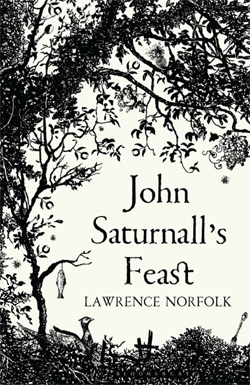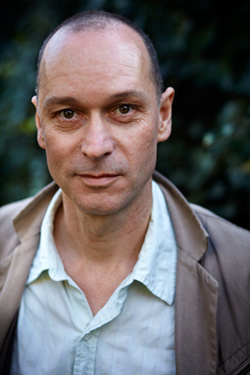You have no items in your cart. Want to get some nice things?
Go shopping
Early signs of Lawrence Norfolk’s John Saturnall’s Feast are promising, especially if you a judge a book by its embossed cover—and the intricate illustrations contained within its pages—made more potent by its synopsis, which made me really want to read the book. Sadly, in the end this early promise doesn’t extend to the entirety of the novel, but for the first third of it at least, I remain enthralled.
There is something mythical and fairytale-like—in the Grimm sense—in the way the story begins:
The packhorses crept down the valley. Swept by waves of fine grey rain, the distant beasts lurched under pack-chests and sacks. At their head, a tall figure leaned into the drizzle as if pulling them away from the dark village above. Standing beside the wooden bridge at the bottom, a long-faced young man peered out from under his hat’s dripping brim and grinned.
Instantly, it incites my curiosity. I want to know what the packhorses are carrying (I especially like how Norfolk calls them “distant beasts”, a small detail which really magnifies the feel of the novel), what the dark village is, who the long-faced young man is and what business he has with the tall figure descending the valley. The importance of a strong start to a novel can’t be understated, and this is possibly one of the best first paragraphs I’ve ever read.
Soon, we learn that one of the packhorses is carrying a boy to Buckland Manor. The boy is John Sandall, now an orphan. He had lived with his mother on the fringes of a village in Buckland Vale, at turns shunned and sought after; his mother was a medicine woman who delivered many of the newborns in the village and cured the villagers’ ailments, but many believed she was capable of such powers only because she was a witch. They bore John and his mother with grudging tolerance, until the plague came; then they blamed her for it, and drove her and her son out into Buccla’s Wood, so named for the witch who, according to legend, had bewitched the whole Vale with her Feast until Saint Clodock reclaimed it “for God”.
While they took refuge in the woods, John’s mother passed on to him everything she knew, and together they conjured feasts of their imaginations even as they subsist on apples and bread made from chestnuts. Soon, she reveals to him that in fact, Buccla wasn’t really a witch; she was Bellica, who had brought her Feast to the Vale after the Romans abandoned Britain. Buccla’s Wood is the only thing—that is, besides John and his mother—that remains of Saturnus’s people, who in those days lived and feasted in the valley as equals. It turns out that John is, in fact, not John Sandall but John Saturnall, a descendant of Saturnus and as such, like his mother, a keeper of the Feast.
This becomes John’s calling: he must keep the Feast—and he seems right for the job. He has inherited from his mother the ability to merely breathe and know any smell. Once he is deposited at Buckland Manor, where his mother also used to work, he is swiftly taken into the subterranean kitchens. Slowly, he works his way up from kitchen boy to become the Master Cook of the manor. Many challenges come his way: when Lady Lucretia refuses to eat in defiance of her father, John must tempt her into surrendering; when the King visits, he must conjure a feast fit for royalty; when supplies run into the ground during the civil war and starvation threatens, he must think of ways to keep everyone at the manor alive. As John and Lucretia fall in love and defy social boundaries, they too bring the rest of the manor together, living and feasting together as equals.
Beyond this though, what does keeping the Feast mean? The word is capitalised throughout the novel, and I kept waiting for that “Aha!” moment when it would all crystallise, but it never did—perhaps I’m just missing something. Then I realise that perhaps it is simply that the Feast is everything: it is faith, it is love, it is war. In a recent article in the Guardian, Norfolk writes, “We care about food in literature not when it is deployed as a symbol but when it becomes a language.” It is in this way that food and sensory pleasure is deployed in John Saturnall’s Feast.
Still, considering how much emphasis has been placed on the Feast, I feel like I am left chewing on thin air, and I suspect this has to do with the mythical promises the novel seemed to have made on the outset. I hadn’t pegged the book as historical fiction until about halfway through, and the beginning had set the tone strongly for me, and so eventually disappoints because it can never go far enough, limited by the realism of history, which in this case is seventeenth-century England besieged by political turmoil and religious persecution. The interplay between myth and history don’t sit well together.
What I most enjoyed about this book are the worlds Norfolk brings to life, especially that of the underground kitchens at Buckland Manor—a heaving, steamy, aromatic operation. The language Norfolk uses is perfectly in tune with the sense of place and time of the novel, though as a reader you would have to do your fair share of work with the arcane—but poetic—food and cooking vocabulary, which often breaks the flow of the story for me, and which I often have the urge to skip over after one too many. (If you decide to read this book, it may be helpful to have this glossary as a companion.) As such, the archaic recipes from John Saturnall’s cookbook that precede each chapter, though exquisitely illustrated, do nothing for me—but keep in mind, this would be a great book for a literary supperclub. Still, every little detail sits perfectly in the balance to create an entirely believable world that inspires a sense of wonder, and I admire Norfolk his meticulous research in bringing back a state of being which no longer exists.

Where the novel ultimately falls, however, is in its characters. There are too many of them to begin with, and I never feel as if I know John or Lucretia. The portraits of them as children are the most deeply etched but other than that, they appear as mere sketches, simply running through the motions of the plot lines; as such, their actions never take on the consequence they should for me. The funny thing is: a lot happens in this novel as we journey with John from boy to man, and yet, this tale never reads like a narrative-driven story; somehow, every new turn never quite comes as a revelation. I often felt that I was waiting for something to happen that would make me feel like I’d reached the turning point I’d be waiting for, for it to move me—but it never did.
First published on 13 September. Available in hardcover and ebook. Paperback out on 9 May 2013.
Thanks to Bloomsbury for providing a review copy.

About Emily Ding
Emily joined Litro in April 2012 as Literary Editor & Web Designer. She made over the website and introduced new developmental and editorial features to strengthen Litro's online presence. She left her position in January 2013, taking a backseat as Contributing Editor to concentrate on writing. She is a freelance journalist with a special interest in travel writing and foreign reporting (with an inclination for Asia and Latin America), and is now based in Malaysia. English is her native language, but she also speaks Mandarin and Spanish, having spent 2007-08 travelling in Central America.





Бездепозитный бонус в казино с выводом денег за… Бездепозитный бонус в казино 2018 онлайн за регистрацию. С бонусом проводить азартный отдых можно совершенно бесплатно и при этом выигрывать реальные призы.